Welcome to WordPress. This is your first post. Edit or delete it, then start blogging!
Spark interview: Sue Bradford on the unemployed workers' movement
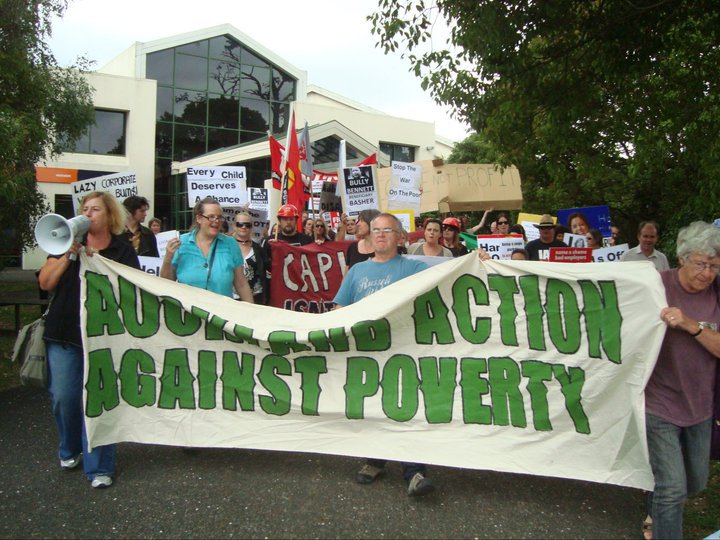 Over the weekend Auckland Action Against Poverty held a workshop to devise their next campaign. During the break Spark writer Ian Anderson sat down with Sue Bradford to discuss the history and future of the unemployed workers’ movement.
Over the weekend Auckland Action Against Poverty held a workshop to devise their next campaign. During the break Spark writer Ian Anderson sat down with Sue Bradford to discuss the history and future of the unemployed workers’ movement.
Spark: How will National’s recently announced welfare reforms affect beneficiaries?
SB: For youths of 16-17 years old it will mean the state, or private service providers, managing their income. My fear with this is that it will be extended to more beneficiaries, as the Welfare Working Group recommended.
For solo mothers it will mean work testing and harassment. In July they’ll be announcing reforms targeting people on the Sickness Benefit.
Spark: Why must all workers oppose these attacks?
SB: The worse it is for beneficiaries and the unemployed, the more competition for low paid jobs, the easier it is to drive down wages and conditions.
The capitalist system needs unemployment. Lately people have been very open about this, saying a certain amount of unemployment is good for economic growth. Continue reading “Spark interview: Sue Bradford on the unemployed workers' movement”
ANZCO Lockout Ends
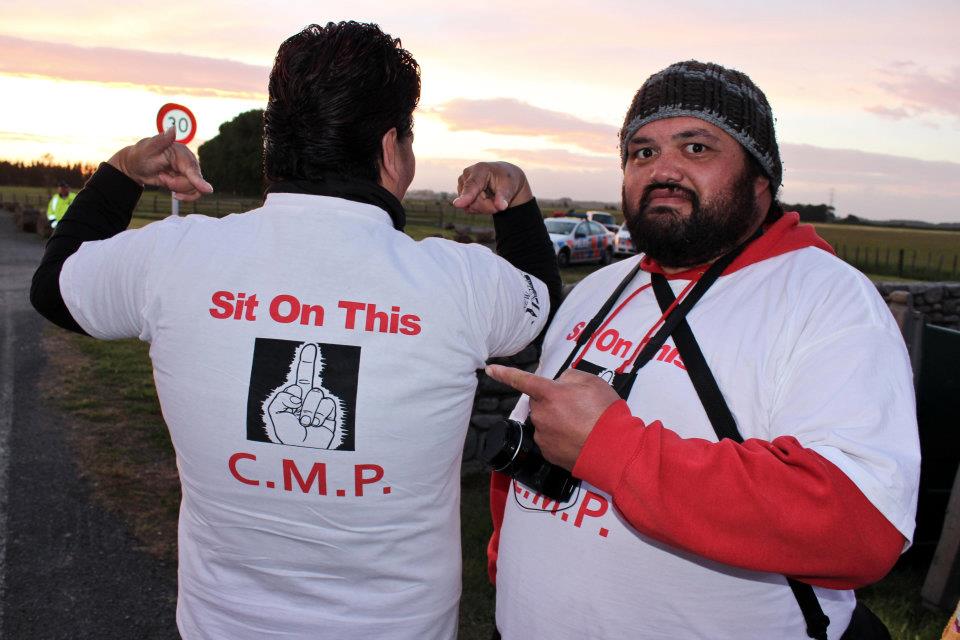 On Thursday the 22nd of December, after nearly 3 months locked out, workers at meatworks ANZCO-CMP Rangitikei voted to return to work.
On Thursday the 22nd of December, after nearly 3 months locked out, workers at meatworks ANZCO-CMP Rangitikei voted to return to work.
A corporation jointly owned by New Zealand and overseas investors, ANZCO aimed to cut costs and smash the Meat Workers Union. A week before the lockout began, letters were sent to all union members onsite demanding they accept pay cuts of 20-30%, and leave the union, before returning to work. While a significant number accepted the pay cuts, 111 workers refused, including many of the skilled workers onsite. The union took a position of accepting 10% pay cuts which the company did not accept.
The decision to stand strong against a brutally exploitative local corporation inspired nationwide solidarity efforts. While the Maritime Union was the only major union to make significant financial contributions from the start, community efforts as far south as Invercargill and as far north as Whangarei raised up to $46,000 p/w, exceeding the CTU target of $25,000. Even this number was meagre when divided up between families, but solidarity efforts did a lot to boost morale.
After negotiations repeatedly broke down, Council of Trade Unions head Helen Kelly was drafted in to mediate. Just before Christmas, the negotiating team recommended a deal with reduced pay-cuts and without some of the former cuts to conditions. With the site becoming increasingly split, workers voted to return.
We will publish an analytical article in the February edition of the Spark. In the coming months it is crucial that radicals consider and debate the significance of this struggle.
Solidarity against CMP lockout, Auckland fundraiser, Christchurch picket
On October 29 we reported on the current CMP meat industry lockout and fundraising efforts (see article here). We enourage all Auckland readers of this website to attend the upcoming fundraiser at Trades Hall, which appears to be organised by Socialist Aoteroa members and other progressives. We encourage all readers or sympathisers in Christchurch to join the picket against CMP at its head offices initiated by Occupy Christchurch.
The details of these events are below, slighlty adapted from the November 2 Global Peace and Justice Auckland newsletter. Donations are still encouraged and requested so please donate to Disputes Fund (name of account) 38-9007-0894028-08 (account number)
Auckland Fundraiser: 6pm, Friday, November 4, Trades Hall, 147 Great North Rd:
SOLIDARITY WITH LOCKED OUT MARTON WORKERS http://www.facebook.com/groups/211101752294033/ 6pm, Friday, November 4, Trades Hall, 147 Great North Rd, Auckland: Friday fundraiser for the locked out Marton Meat Workers: 6pm, Fri Nov 4, Trades Hall, 147 Great North Rd, Grey Lynn. Music from Lubin Rains (Vietnam War) and Caoimhe Macfehin (Drab Doo Riffs, Heart Attack Alley). Paul Brown, Scottish folk musician$10 donation on the door. All cash raised going to feed the families of the locked out meat workers. Don’t let them get starved back to work. http://socialistaotearoa.blogspot.com/2011/11/friday-fundraiser-for-locked-out-marton.html
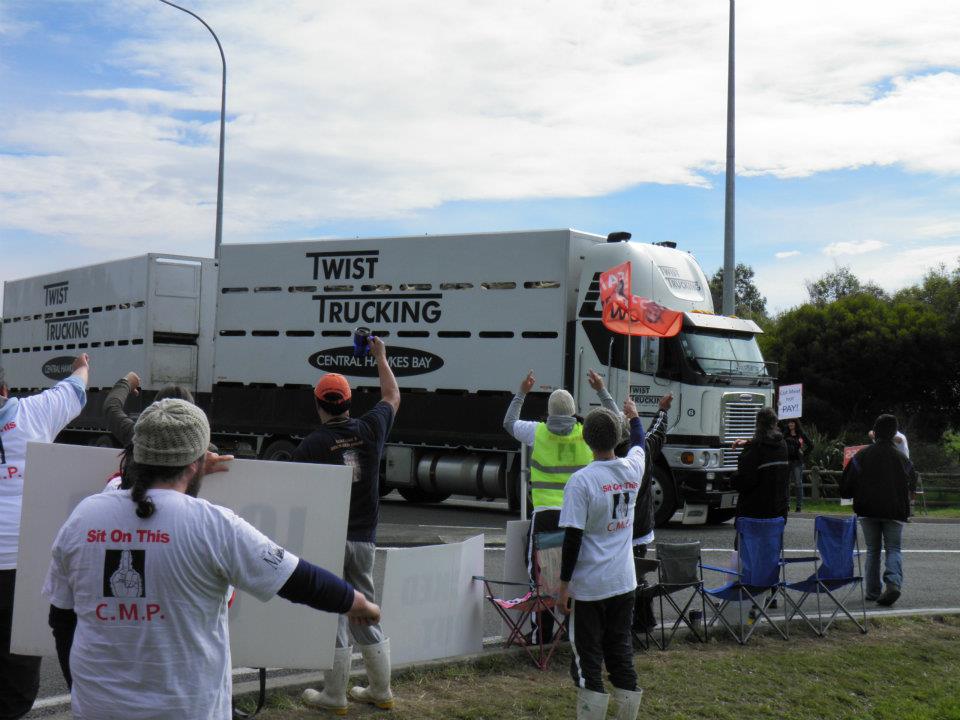
Christchurch – Picket CMP Head Office, 2pm, Saturday, March 5, 100 Carmen Rd:
(The following was part of a statement made by Occupy Christchurch)
At 2pm on Saturday 5th November Occupy Christchurch along with unions, workers campaign groups and local solidarity networks will take to the streets to bring some much needed attention to the plight of the 111 locked-out Canterbury Meat Packer workers. On Saturday 5th November, from 2pm ANZCO Foods Australasia & New Zealand Meat Marketing Office on 100 Carmen Rd will be the stage for an act of solidarity and opportunity to gather some much needed funding for those effected.
CMP is a subsidiary of the multinational corporation ANZCO which supplies New Zealand meat throughout the World. “For almost 2 weeks the unionised workforce at CMP’s Rangitikei’s lamb plant have been locked out by their bosses. Their crime? Not accepting up to a 30% pay cut and a significant decrease in hours.
The 111 workers and their families are now being starved out until they either accept the deal or with the support of the people of Aotearoa beat these disgusting acts of bad faith!” Stated Union Organiser and participant of Occupy Christchurch, Matt Jones. An urgent fund has been set up and money is beginning to pour in – “however with so many mouths to feed there is still a lot to do.” Continued Mr Jones.
“International pressure on this group will also be paramount for the future of our brothers and sisters in Rangitikei. Networking and campaigning in solidarity against big business who put profit before people and hold entire communities to ransom is something the Occupy Movement, combined with unions and the various workers rights campaign groups has the potential to smash and put into the history books ” Concluded Mr Jones. Occupy Christchurch has been based at South Hagley Park for more than two weeks. In support of the Occupy Wall Street phenomena the group hold open daily general assemblies, weekend ‘free markets’ and have been busy networking with community groups and organisations. More information on this picket and updates can be found at www.occupychristchurch.org.nz and by using the search term ‘occupy christchurch’ in Facebook.
November issue of The Spark
![]() Read the November issue here
Read the November issue here
At the end of this month New Zealand will hold a general election. While current polls might lead us to be cynical about voting, we need to remember that our right to vote was fought for by previous generations and shouldn’t be taken for granted. Woman gained the right to vote in this country though a massive popular movement in the latter part of the 19th century. We should be aware that Kate Sheppard believed “All that separates, whether of race, class, creed, or sex, is inhuman, and must be overcome” and saw the gaining women’s’ suffrage as part of that struggle.
We should also remember that in addition to women being denied the vote, there was a time when most men were too. Originally voting was a privilege reserved for land owning men, a democracy only for those who made up the capitalist class. In New Zealand in the 19th century, this excluded Maori who owned land in common, and most of the largely itinerant working class- miners, shearers, sailors- who often had no fixed abode, let alone their own land.
The right for working class men to vote in this part of the world was won by a rebellion of miners at the Eureka Stockade in Victoria, Australia in 1854. Fearing that a similar rebellion could take place on this side of the Tasman, the colonial government enacted Victoria’s suffrage laws, and working class men could now vote. Perhaps it’s fitting then that this issue of The Spark puts a focus on miners.
Marking the one year anniversary of the Pike River Mine disaster and the on-going official inquiry, we are publishing an abridged article from the International Federation of Chemical, Energy, Mine and General Workers Unions looking at the safety concerns at the mine. Labour historian Jared Davidson writes about the role miners have played in the New Zealand labour movement and we examine the position of the West Coast- a region largely dependent on mining- in the context of capitalism.
Also looked at this month is the Occupy Movement, which began in the US (though no doubt inspired by events that began in North Africa) and in October spread around the world. We print the press releases from the occupations taking place in New Zealand cities and an article from the Socialist Party of Australia, looking at the police repression of Occupy Melbourne. It seems a century and a half from Eureka those who right for democratic rights will still be met with state repression. Further coverage of the Occupy movement will appear in our next issue.
Elsewhere in these pages we cover the Rena Oil Spill, the New Zealand tour of S’bu Zikode, a leader of the shack dwellers movement in South Africa, the death of Steve Jobs, and the right to strike. The October issue, which features an article on each of the parliamentary parties as well as an article about the importance of retaining MMP in the referendum, will continue to be circulated between now and the election, and is available wherever you get The Spark.
– Byron Clark, November issue coordinating editor.
Smash the CMP lockout: Fund established, give money now!
Around 100 meat workers in Rangatikei – a provincial township in the Manawatu area – were locked out by Canterbury Meat Packers (CMP) ten days ago.
According to a CTU release the company is attempting to require the union (New Zealand Meat Workers Union) to sign up to a 20-30% wage decrease before any return to work. We also understand that the company is trying to disestablish the 35-hour week and increase the weekly hours of work per employee.
Traditionally the meat industry has contained a powerful section of the workers movement in New Zealand. Because of this the bosses have consciously attacked meat industry employment conditions over the past few decades. Generally the meat industry has been an area in which militant workers and some sections of the left have worked hard to extend and uphold conditions. The 35-hour week (which is particularly important in the meat industry given the physical demand of the work) is an example of these efforts.
The CMP bosses announced record profits last year. This is obviously a strategic attack. By maintaining the lockout they appear to be ‘digging in’.
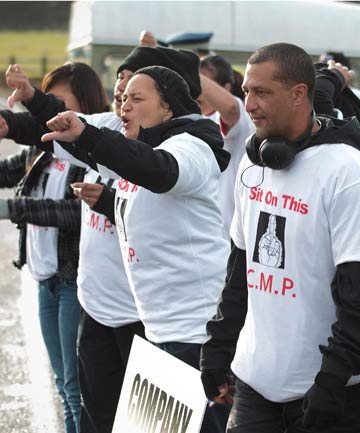
The bosses cannot be allowed to win as this would make a precedent for further attacks on the working class particularly in the meat industry.
Unions are encouraging local and Wellington people to attend the week-day picket line and give donations of food and supplies. Additional picket line infrastructure is also required such as trailers, gazebos, etc.
The CTU has set up a dispute fund for contributions. The account number is 38-9007-0894028-08.
Initially Workers Party has donated $200 and members will be collecting, including amongst dairy industry workers in Hamilton and at Occupy Wellington. We pledge to increase our donation to a modest $500 over the next few days. We also urge all New Zealand readers of this website who are in comfortable employment to donate the equivalent of one day’s pay.
Occupied Dominion Post: letter to the editor
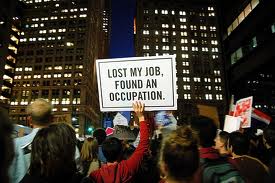 Originally printed in Issue 2 of the Occupied Dominion Post, publication by members of Occupy Wellington.
Originally printed in Issue 2 of the Occupied Dominion Post, publication by members of Occupy Wellington.
A recent (Unoccupied) Dominion Post opinion poll presented readers with the choices of supporting Occupy Wellington, or agreeing that “they need to get jobs.” Coupled with generally unsympathetic coverage from the capitalist press, this raised the hackles of some occupiers. At the Occupy Wellington Labour Day march, occupiers carried placard stating “I have a job and an occupation” or “I have two jobs, university and an occupation” – variations on the placard “I lost my job, found an occupation.”
The Occupy Together movement draws in supporters from diverse backgrounds, with a range of employment situations. Many of the core organisers have other commitments, including work and study. Those with full-time work and families may not have the time or energy for urban camping – so they support the movement by donating food or resources, by organising workshops, by coming to General Assemblies. This movement is a broad church.
More to the point, unemployment is a product of the system Occupy Together collectively challenges. Capitalism requires a reserve army of labour, a pool of unemployed workers to keep the labour market competitive. Under neoliberalism – the late stage of capitalism typified by cuts, privatisations and “free market” reform – structural unemployment is used to keep wages down.
The Alister Barry documentary In A Land of Plenty explores how during neoliberal reform, the Reserve Bank used interest rates as a way of keeping unemployment high – and wages low. Suzanne Snivelly, member of the Reserve Bank Board of Directors during the crucial reform period of 1985-1992 states:
“It was a manageable thing for the Reserve Bank to use employment, and unemployment, as the way to get wages down. It was far easier than any other means of getting inflation down. So they used it.”
By demonising occupiers as unemployed layabouts, the DomPost conveniently misses the point: whether or employed or unemployed, we have valid grievances. Capitalists attack the class as a whole – declining real wages, structural unemployment and benefit cuts are all part of the same package. We must counter these attacks with solidarity, unity and inclusiveness. From factory floors, to desks, to WINZ offices – we are the 99%.
-Ian
Occupied Dominion Post: editorial
Let’s get something straight: this movement has issued no demands. It is not a protest. It’s an occupation. Rebellions don’t have demands.
 The above statement is from issue two of the Occupy Wall St Journal and in that spirit we are currently occupying the heart of our city. We’ve set up our tents and kitchens, we’ve put up our banners, and we are refusing to leave. As we reclaim the city we are reclaiming our own minds.
The above statement is from issue two of the Occupy Wall St Journal and in that spirit we are currently occupying the heart of our city. We’ve set up our tents and kitchens, we’ve put up our banners, and we are refusing to leave. As we reclaim the city we are reclaiming our own minds.
We are not just a handful of dreamers – we are realists. We are not stupid – we know something is very, very wrong with the world. We are not cowards – we are stepping up and putting ourselves forward to take part in this movement. We are not naïve – we know the problem is not a few greedy people ruining the system, the problem is a system based on greed that ruins people.
We are not alone. We are all over the world. In hundreds of cities on every continent, we are sharing tents, sharing food, sharing ideas and imagining a world where we share everything. We are trying to change it all from the bottom up. We are the 99%. Continue reading “Occupied Dominion Post: editorial”
Australian Labor Party: "They'd send police to fight the unions that supported them"

Workers Party member Ian Anderson interviews socialist Stephen Jolly, on the Labor Party and recent union elections.
The Spark: Socialist Party recently committed to helping with the Electrical Trades Union (ETU) election, can you tell me why that was?
SJ: The Victorian branch of the ETU is probably the most militant trade union in Australia. When Dean Miles the current state secretary took over in the 1990s, workers on building sites were almost embarrassed to admit they were electricians. Now they’re the highest paid, best organised, and work the shortest week of any construction workers in Victoria – in an industry that’s 100% unionised, so that’s quite something.
And secondly, he’s taken the union out of the clutches of the Labor Party. The leadership organised an internal referendum to ask the members if they wanted to stay affiliated and by overwhelming majority of over 80%, they said no, we want to be independent of the Labor Party. At election time the ETU give election funds sometimes to the Greens, sometimes to what they consider better Labor candidates, and also to the Socialist Party.
We think they should go one step further, and work to create a new workers’ party.
Continue reading “Australian Labor Party: "They'd send police to fight the unions that supported them"”
Right to Strike in Australia
Workers Party member Ian Anderson interviews veteran Australian union activist Dave Kieran, on the recently launched Right To Strike Campaign.
 The Spark: If you could start with a basic overview of the Right to Strike campaign, and how it started.
The Spark: If you could start with a basic overview of the Right to Strike campaign, and how it started.
DK: The right to strike campaign began about a fortnight ago in its current form, where 6 unions attended a meeting to establish a national campaign, and to work practically towards resolutions in workplaces, up through unions and union executives, approach civil society and civil movements, faith-based communities etc seeking similar resolutions of support.
It’s based very much on the International Labour Organisation (ILO) framework, which indicates that the right to strike actually underpins the will of the people; that is, all of our other rights are protected by the right to strike. Certainly industrially, things like the right to organise, right of entry, are protected by the right to strike. Continue reading “Right to Strike in Australia”
